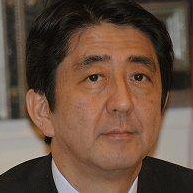The Importance of Being Abe
Japan's Chief Cabinet Secretary, Shinzo Abe (安倍 晋三), is now a candidate for next month's Liberal Democratic Party presidential election and is considered the one most likely to win.

[ Shinzo Abe (from VOA.com)]
Wikipedia reports that, "Abe was born into a prominent political family in Nagato, Yamaguchi Prefecture. His father was Shintaro Abe, former secretary-general of the Liberal Democratic Party (LDP), and his mother's father was former Prime Minister Nobusuke Kishi.
"Following graduation from the Department of Political Science of the Faculty of Law at Seikei University in 1977, Mr. Abe studied politics at the University of Southern California. On his return to Japan, Mr. Abe began work at Kobe Steel, and continued there until 1982. He then served as executive assistant to the Minister for Foreign Affairs, private secretary to the chairperson of the LDP General Council, and then as private secretary to the LDP secretary-general."
The Japanese Wikipedia site has more about him that is not included on the English site. One tidbit is that Shinzo Abe claims to be a descendant of Munetou Abe. Munetou Abe was a member of the Emishi Abe clan that was allowed to rule Iwate in the 9th and 10th centuries in collaboration with the Japanese. They made their headquarters in the Koromo Stockade on the North bank of the Koromo River where it meets the Kitakami. The family monopolized the gold, iron and horse trade in Northern Honshu and traded by sea directly with the Asian mainland. They were also innovative in designing a type of stockade able to withstand a long seige.
This stockade proved quite useful when the Abe's attempted to expand their holdings, refused to pay taxes and rebelled against the central government. This conflict came to be called the Earlier Nine Year War and lasted from 1051 - 1062. Muneto won a stunning victory at the Battle of the Palisade of Torinomi in what is now Kanegasaki Town in 1061 but had to surrender the following year after his brother Sadatou was killed in battle and the Abes were defeated. Muneto was exiled to Kyushu with his family setting the stage for his descendants to produce the next Prime Minister.
Abe's claim to be descended from a fierce Emishi warrior could be seen in various ways. He could be suggesting that he is tough and fierce as well. He might also be trying to show that he is not really such a political insider. Ultimately, though, such a claim allows him to show a strong affinity with the people of rural Northern Japan where he is otherwise a complete outsider!

[ Shinzo Abe (from VOA.com)]
Wikipedia reports that, "Abe was born into a prominent political family in Nagato, Yamaguchi Prefecture. His father was Shintaro Abe, former secretary-general of the Liberal Democratic Party (LDP), and his mother's father was former Prime Minister Nobusuke Kishi.
"Following graduation from the Department of Political Science of the Faculty of Law at Seikei University in 1977, Mr. Abe studied politics at the University of Southern California. On his return to Japan, Mr. Abe began work at Kobe Steel, and continued there until 1982. He then served as executive assistant to the Minister for Foreign Affairs, private secretary to the chairperson of the LDP General Council, and then as private secretary to the LDP secretary-general."
The Japanese Wikipedia site has more about him that is not included on the English site. One tidbit is that Shinzo Abe claims to be a descendant of Munetou Abe. Munetou Abe was a member of the Emishi Abe clan that was allowed to rule Iwate in the 9th and 10th centuries in collaboration with the Japanese. They made their headquarters in the Koromo Stockade on the North bank of the Koromo River where it meets the Kitakami. The family monopolized the gold, iron and horse trade in Northern Honshu and traded by sea directly with the Asian mainland. They were also innovative in designing a type of stockade able to withstand a long seige.
This stockade proved quite useful when the Abe's attempted to expand their holdings, refused to pay taxes and rebelled against the central government. This conflict came to be called the Earlier Nine Year War and lasted from 1051 - 1062. Muneto won a stunning victory at the Battle of the Palisade of Torinomi in what is now Kanegasaki Town in 1061 but had to surrender the following year after his brother Sadatou was killed in battle and the Abes were defeated. Muneto was exiled to Kyushu with his family setting the stage for his descendants to produce the next Prime Minister.
Abe's claim to be descended from a fierce Emishi warrior could be seen in various ways. He could be suggesting that he is tough and fierce as well. He might also be trying to show that he is not really such a political insider. Ultimately, though, such a claim allows him to show a strong affinity with the people of rural Northern Japan where he is otherwise a complete outsider!
Labels: emishi, prime minister, Shinzo Abe
